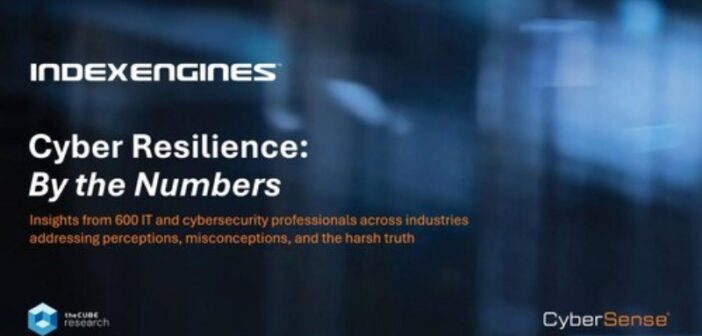For Cybersecurity Awareness Month, Index Engines unveiled results from a new independent study highlighting a significant and costly gap between cyber resilience awareness and true readiness to respond to and recover from cyberattacks.
Conducted by theCUBE Research and based on insights from 600 IT and cybersecurity professionals across North America, Europe, and APAC, the research in this Cyber Resilience eBook highlights a troubling reality: while most organizations recognize cyber resilience as a business imperative, few are equipped to recover when, not if, a cyberattack occurs.
In other words, many report they “know” cyber resilience and consider themselves compliant, yet they lack confidence in their ability to execute a recovery and fully restore critical data under the pressure of a real cyberattack.
The data shows the urgent need for organizations to move beyond awareness and basic compliance, towards actionable recovery strategies that ensure clean, restorable data and business continuity.
Key findings from Cyber Resilience Ebook study include:
- 85% know that cyber resiliency is a top business priority, but 55% admit they do not fully understand it.
- 66% of the organizations surveyed were hit by at least one attack in the past year; 75% saw impacts to the data protection infrastructure and storage systems. Shockingly, 44% endured multiple damaging incidents.
- 54% of victims paid a ransom, yet 92% still lost data after paying it.
- 94% rate their alignment with NIST 2 highly, yet 82% were impacted from an attack.
- Just 4% of those surveyed can ensure a clean, restorable copy of data for 90% of their mission critical applications.
“Recovery is the true measure of cyber resilience—and, as backed by this research, that’s where most organizations fall short,” said Jim McGann, Chief Marketing Officer at Index Engines. “Resilience after an attack means the organization can quickly restore operations, recover data from secure backups, and communicate transparently with stakeholders. Most importantly, resilience is minimizing disruption, data loss, and long-term damage.”
The research makes it clear that checking the box on compliance and framework alignment is not the same as having validated, clean recovery points and a rehearsed, end-to-end recovery playbook. Bridging that gap requires confidence in your data integrity and your organization’s ability to execute when it matters most—not just policies on paper.
As part of its mission, Index Engines delivers CyberSense, the industry’s leading cyber resilience technology designed to ensure confident recovery after ransomware and other cyberattacks. With AI trained on the latest variants, CyberSense detects data corruption from ransomware with an ESG validated 99.99% accuracy—giving organizations the ability to identify clean recovery points and restore uncompromised data quickly.
CyberSense proactively analyzes data’s integrity, enabling faster, smarter recovery decisions by finding the last clean copy of data before restoration, minimizing downtime, data loss, and reputational damage. With the assurance of a clean recovery, CyberSense helps organizations confidently convert awareness and compliance into real-world recovery readiness.
To download the Cyber Resilience Ebook, click here.
Related News:
Index Engines Unveils AI Patent Driving Cyber Resilience on World AI Day

